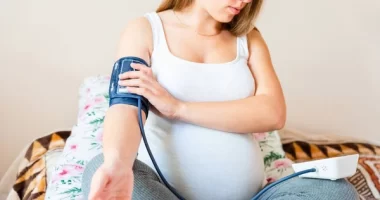Chickenpox is a mild and common childhood illness that most children catch at some point. Most people catch it by the time they’re 10 years old and that’s it. However, adults can get chickenpox too and are more likely to be hospitalised with it. Express.co.uk reveals everything you need to know about chickenpox. Can you get chickenpox twice? Chickenpox is common and mostly affects children, although you can get it at any age.
Known medically as varicella, chickenpox is caused by a virus called the varicella-zoster virus.
It causes a rash of red, itchy spots that turn into fluid-filled blisters that may burst, or they’ll crust over to form scabs that eventually drop off.
Before or after the spots appear, the virus can cause other symptoms such as a high temperature, aches and pains, generally feeling unwell and loss of appetite.
Chickenpox is very itchy and can make children feel miserable, even if they do not have many spots.
Chickenpox spreads quickly and easily from someone who is infected.
Children usually catch it in winter and spring, but it’s particularly common between March and May.
Within one or two days of infection, your child will get an itchy, uncomfortable rash on their scalp and face and it will spread down the body onto the arms and legs.
The spots start as flat pink spots that turn into small water blisters, and new spots will form even after others turn into blisters.
The amount of blisters you have varies, but some children can have as many as 500 at once.
Other than the rash, some of the first symptoms to appear within the first few days are loss of appetite and headache.
The virus can be spread from two days before the rash or any symptoms appear, so it’s very easy to spread without anyone knowing.
It is contagious until all of the blisters have scabbed, which will take a couple of weeks at least.
Chickenpox is mainly spread through the air, with the virus surviving in the air for several hours and entering the body by the nose or mouth.
The infected person doesn’t have to be in the room, they could’ve just been in there recently.
Of course, chickenpox can spread through direct contact, such as touching a blister or the liquid of wet crust from a blister.
In the meantime, you’re supposed to drink plenty of fluids or get your child to eat ice lollies if they won’t drink water to avoid dehydration.
Take paracetamol to help with the pain and discomfort, and cut your child’s nails or put socks on your child’s hands at night to stop scratching.
Bathe in cool water and pat the skin dry rather than rubbing it and wear loose clothes.
Cooling creams or gels from a pharmacy or antihistamine medicine from help itching.
Do not use ibuprofen unless advised to do so by a doctor, as it may cause serious skin infections and do not give aspirin to children under 16.
Anyone infected should not be around pregnant women, newborn babies and people with a weakened immune system, as chickenpox can be dangerous for them.
Can you get chickenpox twice?
If one of your children has chickenpox, it will probably spread to other members of the household who have not already had chickenpox or the chickenpox vaccine.
Over 90 percent of adults are immune to the virus because they’ve had it before.
However, it is possible to get chickenpox more than once in rare cases.
Most people have life-long immunity after having it once, but you might get it again.
This happens mostly if you were very young when you had it the first time.
You can take a blood test to check if you are immune to chickenpox if you’re not sure whether or not you’ve had the disease.
The virus remains inactive in nerve tissue and may reactivate later in life causing another condition called shingles.
Post source Daily Express








